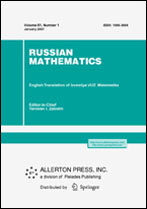|
On the radial symmetry property for harmonic functions
V. V. Volchkov, Vit. V. Volchkov
Donetsk National University, 24 Universitetskaya str., Donetsk, 83001 Ukraine
Abstract:
Let $\Gamma$ be a closed smooth Jordan curve in the complex plane $\mathbb{C}$, $G$ be a bounded domain in $\mathbb{C}$ with boundary $\Gamma$, and let $\overline{G}=G\cup\Gamma$. We study functions that are continuous in $\mathbb{C}\setminus G$ and harmonic in $\mathbb{C}\setminus\overline{G}$ that grow more slowly than the function $|z|^2$ at $z\to\infty$. It is shown that if in the class of such functions there exists a solution to the overdetermined Neumann boundary value problem in which the function on $\Gamma$ and the existence and being equal to unity of the normal derivative of a function $\mu$ -almost everywhere on $\Gamma$ then the domain $G$ is a disk (Theorem 1). In this case, the solution is the only one and up to a constant coincides with the fundamental solution for the Laplace operator in $\mathbb{\mathbb{C}}$ and a singularity in the center of the disk $G$. The proof of Theorem 1 is based on the application of the conformal mapping of the exterior of the unit disk onto the domain $\mathbb{C}\setminus \overline{G}$. This mapping allows us to reduce the original problem for the domain $\mathbb{C}\setminus \overline{G}$ to overdetermined boundary value problem for the exterior of the disk in which the main difficulty is the heterogeneity of the boundary condition for the normal derivative. To study this condition some subtle results were required on the boundary properties of a function that performs the indicated the conformal mapping as well as some properties of the Hardy classes $H_p$ in the unit disk. Theorem 2 of the paper shows that in the general case the conditions in Theorem 1 cannot be relaxed. It states the existence of a bounded domain $G\subset\mathbb{C}$ different from a disk with a smooth Jordan boundary $\Gamma$ and functions $f_1,f_2,f_3\in C(\mathbb{C}\setminus G)$ harmonic in $\mathbb{C}\setminus\overline{G}$ for each of which exactly one of the conditions of Theorem 1 is not satisfied.
Keywords:
harmonic function, boundary behavior, overdetermined problem.
Received: 24.11.2019
Revised: 22.01.2020
Accepted: 25.03.2020
Citation:
V. V. Volchkov, Vit. V. Volchkov, “On the radial symmetry property for harmonic functions”, Izv. Vyssh. Uchebn. Zaved. Mat., 2020, no. 10, 12–23; Russian Math. (Iz. VUZ), 64:10 (2020), 9–19
Linking options:
https://www.mathnet.ru/eng/ivm9615 https://www.mathnet.ru/eng/ivm/y2020/i10/p12
|


| Statistics & downloads: |
| Abstract page: | 201 | | Full-text PDF : | 56 | | References: | 31 | | First page: | 1 |
|





 Contact us:
Contact us: Terms of Use
Terms of Use
 Registration to the website
Registration to the website Logotypes
Logotypes








 Citation in format
Citation in format 